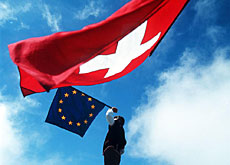
EU agrees to guarantee Swiss banking secrecy

European Union diplomats have agreed to guarantee Swiss banking secrecy in exchange for Bern’s cooperation in taxing EU residents’ savings.
Ministerial level negotiations between Switzerland and the EU will now take place next Wednesday to finalise a series of agreements after years of wrangling.
Non-member Switzerland had refused to sign the taxation dossier until the EU agreed to give Bern an exemption on part of another treaty – Schengen – to protect banking secrecy.
“We have an agreement and we will hold an EU-Swiss summit on May 19,” said a spokesman for the Irish presidency.
Diplomats from the 25 EU member states on Thursday finally overcame the last stumbling block – opposition from Luxembourg – by giving that state the same guarantees.
Luxembourg – which also has banking secrecy rules – had refused to countenance an opt-out for Switzerland, saying it would have given the alpine nation’s banks an unfair advantage over its own.
Sweetener
Ahead of Thursday’s meeting, the Swiss government announced it was willing to make a multi-million franc contribution to the EU’s fund for economically-depressed member states.
The European Commission welcomed Switzerland’s offer to provide SFr1 billion (€650 million) over a five-year period for the poorest EU countries.
The funding is subject to the successful conclusion of bilateral negotiations.
Complicated negotiations
Two years of negotiations between Brussels and Bern have been marked by the dispute over Swiss banking secrecy and further complicated by the enlargement of the EU on May 1.
Back in June 2002 a first series of seven bilateral treaties – mainly on labour, trade and transport issues – came into force between Switzerland and the EU.
Just two weeks later, officials from both sides returned to the negotiating table to discuss a follow-up package of ten accords.
Swift progress was made on six dossiers, including Swiss participation in EU education programmes and environmental projects.
But negotiations faltered on the issues of taxation and Swiss membership of the Schengen and Dublin accords, which cover customs fraud and closer cooperation on security and asylum.
Compromise reached
A compromise was reached on the taxation dossier when the Swiss agreed to transfer a withholding tax on EU residents’ savings income to Brussels. This guaranteed banking secrecy and at the same time satisfied the EU’s tax collectors.
But the Swiss government made its agreement conditional on the successful conclusion of all the other bilateral accords under discussion.
Hopes were high that an accord on the withholding tax issue would speed up negotiations on closer security cooperation and efforts to combat customs fraud.
But talks again ground to a halt late last year over a clause in Schengen relating to legal assistance in cases of fiscal fraud.
The EU wanted to extend judicial assistance to include tax evasion – something which is not considered a criminal offence under Swiss law.
The Swiss fear that banking secrecy will be undermined if they are made to hand over information about suspected tax evaders.
Breaking the deadlock
After a break of several months, talks resumed in April with a meeting between Switzerland’s chief negotiator, Michael Ambühl, and his counterpart from the EU Commission, Percy Westerlund.
Both sides agreed on a compromise proposal which foresees that Switzerland will apply legal assistance in cases of indirect taxes (customs, value added tax, and levies on alcohol and tobacco).
But Bern would be exempted permanently from granting the same rights in cases of direct taxation (income tax, corporate tax and capital gains).
Two other issues – granting access to the Swiss labour market to the ten new EU members and Switzerland’s contribution to the special fund to help the least prosperous states – have since been added to the compromise package.
swissinfo
The nine dossiers which make up the second set of Swiss-EU bilateral accords include:
Closer cooperation on security and asylum (Schengen/Dublin).
The fight against international smuggling and other forms of customs fraud.
Taxation of EU residents’ savings income in Swiss banks.
Education and vocational training programmes.
Membership of the European Environmental Agency.
Media – film production, distribution and training.
Free trade of processed agricultural products, such as chocolate, biscuits and pasta.
Access to pan-European statistics.

In compliance with the JTI standards
More: SWI swissinfo.ch certified by the Journalism Trust Initiative





























You can find an overview of ongoing debates with our journalists here . Please join us!
If you want to start a conversation about a topic raised in this article or want to report factual errors, email us at english@swissinfo.ch.